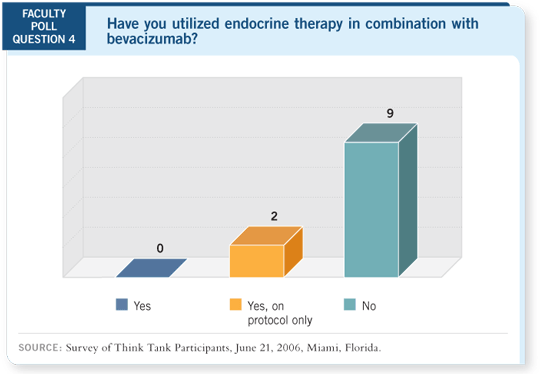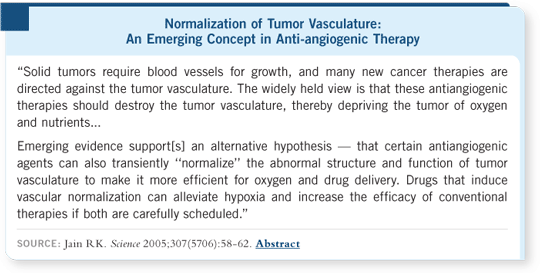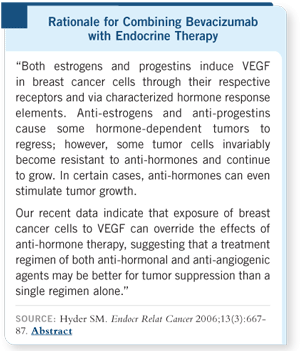

Select Excerpts from the Discussion
CD 1, Track 8
 DR RUGO: In addition to evaluating the combination of capecitabine/bevacizumab,
another research strategy is to combine endocrine therapy with bevacizumab.
Some interesting data indicate that estrogen may directly modulate angiogenesis
through effects on endothelial cells in both physiologic and pathologic
conditions. We also have data indicating that antiestrogen therapy blocks VEGF
expression and estrogen-induced angiogenesis may be blocked by antiestrogen
therapy.
DR RUGO: In addition to evaluating the combination of capecitabine/bevacizumab,
another research strategy is to combine endocrine therapy with bevacizumab.
Some interesting data indicate that estrogen may directly modulate angiogenesis
through effects on endothelial cells in both physiologic and pathologic
conditions. We also have data indicating that antiestrogen therapy blocks VEGF
expression and estrogen-induced angiogenesis may be blocked by antiestrogen
therapy.
Rakesh Jain’s group in Boston has observed an androgen-dependent tumor
model and shown that castration, interestingly, leads to initial vascular regression,
and then a second wave of angiogenesis occurs with vascular regrowth in
this murine tumor model.
So a hypothesis was generated that anti-VEGF therapy may overcome this
resistance of the second wave of angiogenesis seen with endocrine therapy in
animal models and could improve the efficacy of standard hormone therapy in
hormone receptor-positive metastatic breast cancer.

 In the study presented by
Dr Traina at ASCO this
year, 43 patients received
bevacizumab at 15 mg/kg every three weeks and
letrozole at 2.5 mg per day.
The combination appeared
to be well tolerated. The
drug-related toxicities were
expected and only seen in
a small number of patients.
The efficacy analysis, which
wasn’t the primary goal,
was confounded by the long
duration of prestudy aromatase
inhibitor therapy in
most patients, although it did
appear that a number might
have benefited from the
therapy.
In the study presented by
Dr Traina at ASCO this
year, 43 patients received
bevacizumab at 15 mg/kg every three weeks and
letrozole at 2.5 mg per day.
The combination appeared
to be well tolerated. The
drug-related toxicities were
expected and only seen in
a small number of patients.
The efficacy analysis, which
wasn’t the primary goal,
was confounded by the long
duration of prestudy aromatase
inhibitor therapy in
most patients, although it did
appear that a number might
have benefited from the
therapy.
We have planned a Phase III
study within CALGB and the Intergroup in patients with hormone receptorpositive
disease. The patients will be randomly assigned to endocrine therapy
with placebo or bevacizumab (administered every three weeks) as first-line
therapy.
Select publications

